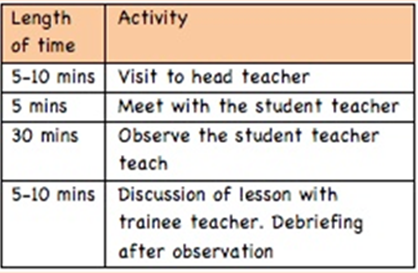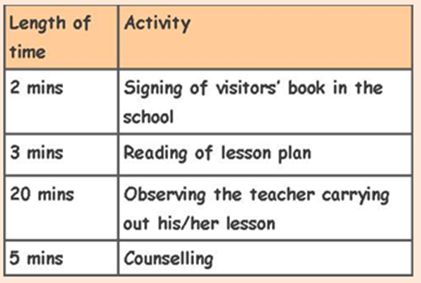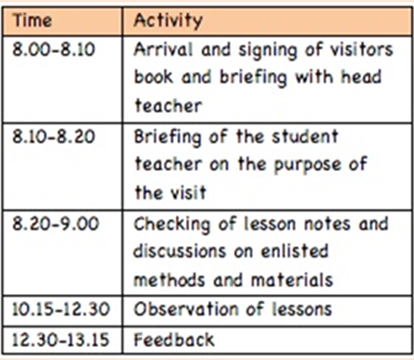7.1 Reflecting on current visit practice
To make a school visit most successful, you need to do some activities before you visit the student teacher in school:
- inform the student teacher and school when you will be visiting
- review documents such as assessment documents
- familiarise yourself with the student teacher’s progress on the course, and read their previous reports.
This preparation sets good foundations for the visit and contributes to its success. What happens during a school visit will depend on various factors, but what a school experience prioritises in the time available will depend on what they think is important.
Activity 7.1: Reflecting on school visits
In this activity you will review your own practice during the school experience visit and consider how you could maximise your support to the student teacher.
Part 1
Think about how you spend your time during a school visit. Write a list of the things you do during a school visit and how long you usually spend on each one.
Now, look at the examples of school visit diaries below.
- how do their experiences and views match yours?
- is there anything that surprises you?
- is there anything they do that you would like to try?
- would you want to alter the length of time that you spend on different activities?
Part 2
Now consider the advice might you give to these supervisors to support student teachers’ classroom practices more effectively.
- which of the three visits is likely to be most helpful for the student concerned?
- what are the implications of your decisions for the distribution of time during your school visits?
- keep a diary yourself on your next three visits. Could you change the balance of your time more effectively to support the student teacher? You might find it helpful to compare your answers with other supervisors.
School visit diaries
Mrs Sakala
 | “The supervision of school experience is very important. It allows you to see if the teacher is prepared for the lesson, can introduce it well, has the instructional materials together and the various methods they use in teaching. I can see if they are giving the children a chance to participate in the lesson rather getting them to copy or just listen. During the school experience period I make sure I have plenty of time to spend on the visit. At that time, I will dedicate myself to it. I spend time briefing the head teacher and the student teacher on the purpose of the visit. I observe a student teacher from the beginning to the end of the lesson and then I take time to provide feedback.” |
|---|
Mr Mulenga
“I feel much valued during the teaching practice, in the sense that after my mentoring there is always improvement in the subsequent lesson delivery, and a lot of cooperation between the head teachers, student teachers and their colleagues. I feel honoured to be able to help student teachers to impact positively on learners in their classrooms. I will always spend time with the head teacher and cooperating teachers when I sign the visitors’ book and check the attendance register. I ask for their feedback and tell them what the student teacher is expected to do for next time.” |  |
Mrs Sinyangwe
 | “I like to spend time on the visits and see more than one lesson if I can, but sometimes this is not possible. I talk to the student teacher to find out what the lesson is about, but I don’t criticise their plan because that would affect their confidence in the lesson. After observing, it is important that I spend time helping the student teacher reflect on their teaching and identify what they need to improve. I invite the cooperating teacher to join the discussion so they feel valued and can learn about different teaching methods.” |
|---|
Tool 7: Conducting the school visit



